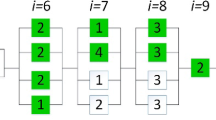Abstract
This paper considers the component assignment problem (CAP) of finding the optimal assignment of n available components to n positions in a system such that the system reliability is maximized. To solve the CAP, an important type of problems in reliability, we propose a Birnbaum-importance based genetic local search (BIGLS) algorithm in which a local search using the Birnbaum importance is embedded into the genetic algorithm. This paper presents comprehensive numerical tests to compare the performance of the BIGLS with a general genetic algorithm and a Birnbaum-importance based two-stage heuristic. The testing results show that the BIGLS is robust (with respect to its random operations) and effective, and outperforms two benchmark methods in terms of solution quality. It demonstrates the effectiveness of embedding the Birnbaum importance in the local search under the genetic evolutionary mechanism.


Similar content being viewed by others
Notes
A Lin/Con/k/n:F (G) system is an ordered sequence of n components arranged in a line such that the system fails (works) if and only if at least k consecutive components fail (work) (Kuo and Zuo 2002).
Cir/Con/k/n systems represent circular consecutive k-out-of-n systems, which are same as Lin/Con/k/n systems except all components are arranged in a circle rather than a line (Kuo and Zuo 2002).
References
Birnbaum, Z. W. (1969). On the importance of different components in a multicomponent system. In P. R. Krishnaiah (Ed.), Multivariate analysis (Vol. 2, pp. 581–592). New York: Academic Press.
Davis, L. (1991). Handbook of genetic algorithms. New York: Van Nostrand-Reinhold.
Fleurent, C., & Ferland, J. (1996). Genetic and hybrid algorithms for graph coloring. Ann Oper Res, 63, 437–463.
Freisleben, B., & Merz, P. (1996). A genetic local search algorithm for solving symmetric and asymmetric traveling salesman problems. In Proceedings of the 1996 IEEE international conference on evolutionary computation (pp. 616–621). New York: IEEE Press.
Grefenstette, J. J., Gopal, R., Rosmaita, B., & Cucht, D. V. (1985). Genetic algorithms for the traveling salesman problem. In Proceedings of the first international conference on genetic algorithms and their applications (pp. 160–168). Hillsdale: Erlbaum.
Goldberg, D. E. (1989). Genetic algorithms in search, optimization, and machine learning. Reading: Addison-Wesley.
Goldberg, D. E., & Lingle, R. (1985). Alleles, loci, and the traveling salesman problem. In Proceedings of the first international conference on genetic algorithms and their applications (pp. 154–159). Hillsdale: Erlbaum.
Hartmann, S. (2001). Project scheduling with multiple modes: a genetic algorithm. Ann Oper Res, 102, 111–135.
Józefowska, J., Mika, M., Różycki, R., Waligóra, G., & Weglarz, J. (2001). Simulated annealing for multi-mode resource-constrained project scheduling. Ann Oper Res, 102, 137–155.
Kontoleon, J. M. (1979). Optimal link allocation of fixed topology networks. IEEE Trans Reliab, 28, 145–147.
Koulamas, C., Antony, S. R., & Jaen, R. (1994). A survey of simulated annealing applications to operations research problems. Omega—Int J Manag, 22, 41–56.
Kuo, W., & Zhu, X. (2012a). Relations and generalizations of importance measures in reliability. IEEE Trans Reliab, 61, 659–674.
Kuo, W., & Zhu, X. (2012b). Some recent advances on importance measures in reliability. IEEE Trans Reliab, 61, 344–360.
Kuo, W., & Zuo, M. J. (2002). Optimal reliability modeling: principles and applications. Hoboken: Wiley.
Levitin, G., Rubinovitz, J., & Shnits, B. (2006). A genetic algorithm for robotic assembly line balancing. Eur J Oper Res, 168, 811–825.
Lim, M. H., Yuan, Y., & Omatu, S. (2000). Efficient genetic algorithms using simple gnens exchange local search policy for the quadratic assignment problem. Comput Optim Appl, 15, 249–268.
Lin, F. H., & Kuo, W. (2002). Reliability importance and invariant optimal allocation. J Heuristics, 8, 155–171.
Malon, D. (1984). Optimal consecutive-2-out-of-n:F component sequencing. IEEE Trans Reliab, 33, 414–418.
Pentico, D. W. (2007). Assignment problems: a golden anniversary survey. Eur J Oper Res, 176, 774–793.
Shingyoch, K., Yamamoto, H., Tsujimura, Y., & Akiba, T. (2010). Proposal of simulated annealing algorithms for optimal arrangement in a circular consecutive-k-out-of-n:F system. Qual Tech Quant Manag, 7, 395–405.
Shingyoch, K., Yamamoto, H., Tsujimura, Y., & Kambayashi, Y. (2009). Improvement of ordinal representation scheme for solving optimal component arrangement problem of circular consecutive-k-out-of-n:F system. Qual Tech Quant Manag, 6, 11–22.
Tseng, L.-Y., & Lin, Y.-T. (2009). A hybrid genetic local search algorithm for the permutation flowshop scheduling problem. Eur J Oper Res, 198, 84–92.
Yao, Q., Zhu, X., & Kuo, W. (2011). Heuristics for component assignment problems based on the Birnbaum importance. AIIE Trans, 43, 633–646.
Zhu, X., & Kuo, W. (2008). Comments on “A hierarchy of importance indices”. IEEE Trans Reliab, 57, 529–531.
Zhu, X., & Kuo, W. (2012). Importance measures in reliability and mathematical programming. Ann Oper Res. doi:10.1007/s10479-012-1127-0.
Zhu, X., Yao, Q., & Kuo, W. (2012). Patterns of the Birnbaum importance in linear consecutive-k-out-of-n systems. AIIE Trans, 44, 277–290.
Zuo, M. J., & Kuo, W. (1990). Design and performance analysis of consecutive-k-out-of-n structure. Nav Res Logist, 37, 203–230.
Zuo, M. J., & Shen, J. (1992). System reliability enhancement through heuristic design. 1992 OMAE-Volume II, Safety and Reliability, ASME. pp. 301–304.
Acknowledgements
This work is supported in part by a National Science Foundation Project # CMMI-0825908.
Author information
Authors and Affiliations
Corresponding author
Rights and permissions
About this article
Cite this article
Yao, Q., Zhu, X. & Kuo, W. A Birnbaum-importance based genetic local search algorithm for component assignment problems. Ann Oper Res 212, 185–200 (2014). https://doi.org/10.1007/s10479-012-1223-1
Published:
Issue Date:
DOI: https://doi.org/10.1007/s10479-012-1223-1




